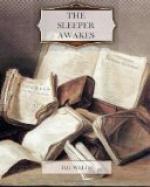INSOMNIA
One afternoon, at low water, Mr. Isbister, a young artist lodging at Boscastle, walked from that place to the picturesque cove of Pentargen, desiring to examine the caves there. Halfway down the precipitous path to the Pentargen beach he came suddenly upon a man sitting in an attitude of profound distress beneath a projecting mass of rock. The hands of this man hung limply over his knees, his eyes were red and staring before him, and his face was wet with tears.
He glanced round at Isbister’s footfall. Both men were disconcerted, Isbister the more so, and, to override the awkwardness of his involuntary pause, he remarked, with an air of mature conviction, that the weather was hot for the time of year.
“Very,” answered the stranger shortly, hesitated a second, and added in a colourless tone, “I can’t sleep.”
Isbister stopped abruptly. “No?” was all he said, but his bearing conveyed his helpful impulse.
“It may sound incredible,” said the stranger, turning weary eyes to Isbister’s face and emphasizing his words with a languid hand, “but I have had no sleep—no sleep at all for six nights.”
“Had advice?”
“Yes. Bad advice for the most part. Drugs. My nervous system.... They are all very well for the run of people. It’s hard to explain. I dare not take ... sufficiently powerful drugs.”
“That makes it difficult,” said Isbister.
He stood helplessly in the narrow path, perplexed what to do. Clearly the man wanted to talk. An idea natural enough under the circumstances, prompted him to keep the conversation going. “I’ve never suffered from sleeplessness myself,” he said in a tone of commonplace gossip, “but in those cases I have known, people have usually found something—”
“I dare make no experiments.”
He spoke wearily. He gave a gesture of rejection, and for a space both men were silent.
“Exercise?” suggested Isbister diffidently, with a glance from his interlocutor’s face of wretchedness to the touring costume he wore.
“That is what I have tried. Unwisely perhaps. I have followed the coast, day after day—from New Quay. It has only added muscular fatigue to the mental. The cause of this unrest was overwork—trouble. There was something—”
He stopped as if from sheer fatigue. He rubbed his forehead with a lean hand. He resumed speech like one who talks to himself.
“I am a lone wolf, a solitary man, wandering through a world in which I have no part. I am wifeless—childless—who is it speaks of the childless as the dead twigs on the tree of life? I am wifeless, childless—I could find no duty to do. No desire even in my heart. One thing at last I set myself to do.




